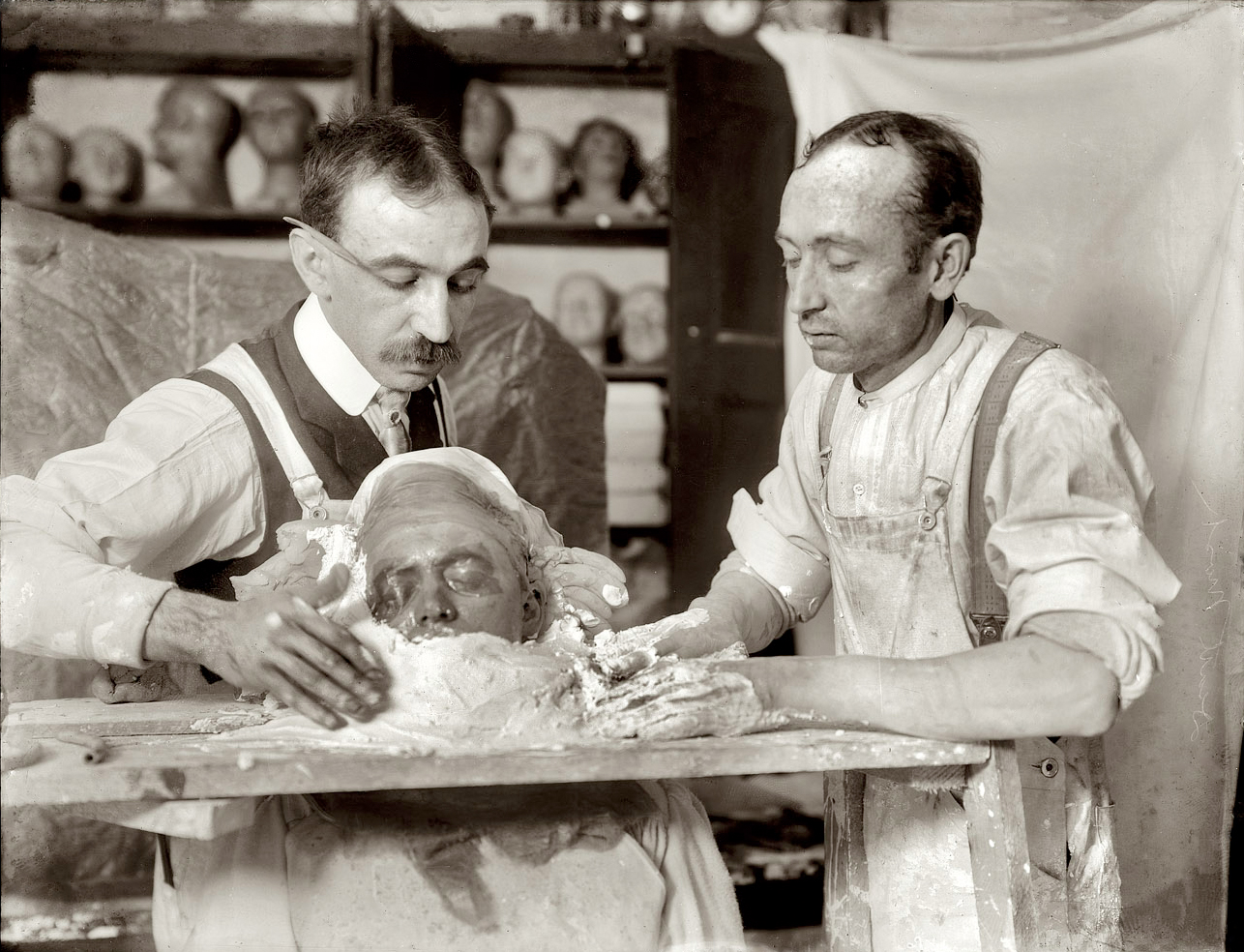Today working away on some research in a museum archive, I overheard a researcher who was seemingly constantly getting up to ask the archivist questions. While they were, of course, being very polite, I personally found their questions incredibly annoying. ‘Your catalogue only tracks the provenance of this item to this date… what happened before that?’ “Can you ask a curator? Why wasn’t this included? You don’t seem to have the catalogue of the previous owner two times removed, why is that?” Oh dear researchers, maybe it would be helpful to explain just a wee bit about provenance.
 |
| Making a death mask, c.1908 |
Provenance is all important in a museum, for lots of reasons
– curatorial, legal etc. But let’s get this straight, provenance is a bitch. By
provenance, we mean the history of any object or artifact from its original
creation to its arrival in the museum. As in - who owned it? Who made it? Who sold it? Prized are the few objects in a
collection which have a clear, complete and above-board history that resulted in them
sitting in our display cases. Much more often the history is pretty damn
complicated.
This particular enquiry I overheard was (and I’ll try to be
general) related to a death mask that ended up in a museum collection in the
early 19th century. The mask itself was bought at auction, so really
the beginning point of the provenance that was available was the name of the
donor to that original collection as provided in the auction manual. And that’s
is, that’s all the information there is. The researcher seemed puzzled by this,
but personally I thought that was pretty thorough. Some enterprising curator
had not only tracked down the acquisition info from the early 19th
century, but also did enough research to get their hands on an original acquisition
catalogue. Is it the museum’s responsibility to know the history even further
than that, as this researcher way implying? Yes and no.
Yes it would be amazing if museums have the time to do that
extensive amount of provenance research on every item in their collection. But
we are all overworked and look after thousands if not millions of objects, so
there’s logistical reasons why not. Secondly, sometimes that information just
does not exist- it has been lost to the sands of time. Most auction houses kept
their sellers information private, or destroyed it, so if your research is
coming up to an auction, the buck might stop there. Also not forgetting that
the Victorians (who founded most of our museums) were pretty slapdash when it
came to documentation anyway.
In certain cases museums really do have to do a complete provenance check on an object, and that's usually when its going into an exhibition. To comply with the conditions of loan agreements, museums have to be able to prove they are the legal owners of an object or they can end up in some nasty trouble with spoliation. So in a way, yeah, it is a museums job.
In certain cases museums really do have to do a complete provenance check on an object, and that's usually when its going into an exhibition. To comply with the conditions of loan agreements, museums have to be able to prove they are the legal owners of an object or they can end up in some nasty trouble with spoliation. So in a way, yeah, it is a museums job.
 |
| Stevens auction catalogues |
But on the other hand, no, it’s not reasonable to expect a
museum to have a complete provenance of everything in their collection.
Especially in this case where the institution had traced the original
acquisition, but not further. That would be the cherry on top, but it’s
certainly not standard.
But actually this is what makes researching in museum
collections so exciting- the opportunity for discovery! Doing ‘object
biographies’ has become all the range in academia these days and resulted in a
huge surge in research interest in museum collections. That’s because if you
can figure out the exiting life of an object that’s a great opportunity for
original research! If the museum had already done it, it would be worth your
time. And in fact, this is why museums love to help researchers- because we
need this kind of research to be done!

No comments:
Post a Comment